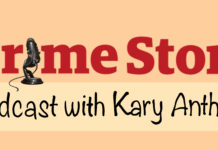Crime Story has partnered with the Podcast giant Acast to host, distribute, and monetize our original podcast series, Jury Duty: The Trial of Robert Durst. The groundbreaking series tells the stories presented in a murder trial as the trial is happening. Jury Duty: The Trial of Robert Durst is available on all podcast players, including Apple Podcasts, Spotify, and the Acast app. You can find all of the episodes here.
On Friday, July 17, the opposing parties in the trial of Robert Durst for the murder of Susan Berman reconvene in Department 1 at the Inglewood Courthouse, a drab mashup of Brutalist exterior and 1960s public high school interior that provides more space for social distancing than the trial’s usual courtroom. At issue is yet another defense motion for mistrial; Durst’s team asserts again that the lengthy hiatus in the trial due to the pandemic constitutes “irreparable damage” to their client’s right to a fair trial. As reported in The Robert Durst Trial: Mistrial Hearing (Crime Story, July 8), Judge Mark E. Windham denied the defense’s previous motions on June 23 but encouraged them to focus their efforts on seeking an adjournment and filing new papers.
It’s just over three weeks later: is this new hearing justified? Have the circumstances of the pandemic changed sufficiently to merit reconsideration of a mistrial? And if a mistrial continues to be a non-starter, can the parties find a way to adjourn and also meet the People’s desire to avoid another lengthy jury selection process (which would be all the more time-consuming in a COVID-19 environment)? The mood is vaguely irritable: here we go again.
Mid-hearing, however, Deputy District Attorney John Lewin proposes a surprise procedural adjustment that clears the air in the courtroom and makes everyone sit up straight. Lewin, no stranger to Hollywood bells-and-whistles, shows his flair for the dramatic. He pulls two rabbits out of his hat… at the same time.
First, let’s set the scene. A masked Judge Windham enters the courtroom. All of Durst’s attorneys join by speaker phone except Chip Lewis, who has traveled to LA from Houston to be the lone defender in court. Robert Durst is neither in the courtroom nor on the phone. He has waived his right to appear at this hearing, choosing to remain in his private hospital room at the LA county jail. Lewin and two co-counsel, Ethan Milius and Eugene Miyata, are in court. Other members of the prosecution team join by phone.
Judge Windham dives right in and immediately declares that he is inclined to deny the defense’s renewed motion for a mistrial but invites any additional arguments from Durst’s attorneys.
Despite Chip Lewis’s presence in the courtroom, David Z. Chesnoff speaks for the defense via telephone from Las Vegas. Chesnoff presents a comprehensive argument for mistrial, laying out the risks, both health-related and constitutional, of resuming his client’s jury trial in the midst of the pandemic. He urges that this trial “must be done in a demonstrably safe and constitutional environment. And presently that environment does not exist in Los Angeles, regardless of everyone’s good intentions, including the Court’s. Not granting a mistrial under these circumstances will violate [Mr. Durst’s] rights and endanger the health of us all. The desire to avoid another jury selection cannot possibly outweigh all the constitutional and health concerns that currently exist.” A half hour into his passionate if familiar argument, there is restless shifting in the socially-distanced gallery seats. In contrast to its dynamic opening arguments and two days of witness testimony back in March, the People v. Robert Durst currently seems seized up, like a motor drained of oil.
Deputy DA Lewin notes the redundancy of the Durst team’s mistrial motions. “These are the identical arguments that counsel made previously. Identical. Nothing has changed.” Lewin points to various defense assertions, disputing that the Durst trial is the only case in the Los Angeles County Superior Courts that has been delayed; that after two days of testimony, the People were “deep into their case;” and that there are insufficient mechanisms for refreshing jury recollection after lengthy adjournments.
But Lewin’s arguments thus far are merely preamble, a set-up. Now for part one of his tactical surprise. “We make the offer today, right now, knowing how much both sides respect this Court, how much admiration both sides have for this Court. We are more than willing today, your Honor, to right now agree that we continue this case as a Court Trial, whenever the Court deems that it’d be safe.” In a “Court Trial,” Durst would agree to waive his right to a jury trial, the jury would be dismissed and Judge Windham would decide both fact and law in the case. It’s safe to say that no one saw this coming.
“That then eliminates any issue of jurors,” Lewin continues. “And if, in fact, counsel… is interested in doing this trial and has the same respect for the Court that they have previously related, I’m sure they’ll take us up on that offer right now.” In short, Lewin dares the Durst team not to accept. Like a boxer throwing a combination, Lewin follows quickly with a second, equally stunning proposal. Presuming the defense declines a bench trial, he suggests, “Let’s have the jurors come back in April, 2021. Our same jury. They will be told at this point in time, ‘You know what? You don’t need to worry about this case at all until April. You make your plans, you do what you want to do. And when April comes, if we are in a position where it’s safe, we will pick it back up. If not, then we’ll wait until June.’”
Having stunned the participants with his litigatory pragmatism, Lewin then takes a thinly-veiled swipe at the integrity of several members of the defense team. “I want to make sure, your Honor, that each of the defense attorneys in this case is going to end up signing a declaration under penalty of perjury, that they will not be appearing in a courtroom in any case during the interruption of this trial.” If they’re too COVID-averse to participate in the Durst trial, Lewin suggests, then they should be prevented from stepping into any other courtrooms.
On speakerphone, David Chesnoff parries aggressively. He takes issue with Lewin’s “dismissive, ridiculing” suggestion that the defense is disingenuous and their arguments don’t make sense. “This is the collective work of a lot of very, very concerned and disciplined minds,” Chesnoff asserts. “I’m not including myself in that. I’m talking about the people who help prepare all of this work. And I … I feel an obligation to them considering the amount of effort that’s gone into this on an almost daily basis, your Honor, to stay on top of this, to make sure that Mr. Durst’s rights are protected….”
Lewin has a nervous tic of jiggling his leg when he’s hearing the defense out; right now, his leg is in constant motion. But Chesnoff isn’t finished. “And please, your Honor, you know, we’ve been doing this together for a long, long time. And yet every time I work hard to prepare and make a cogent argument as best I can, I get told that I’m doing this for ulterior motives. Your Honor, believe me, David Chesnoff wants to try this case. I’m not trying to do anything here that actually helps me. Everything that’s happening here is to help Mr. Durst. And that’s how everybody on our team feels about it, and has always felt about it. So I really wish at some point in time, your Honor, the Court would tell the People that it’s better just to stick to the law than to these kinds of ad hominem attacks… on our motivation.”
Windham’s ruling is characteristically patient and cogent, attempting to soothe Chesnoff and still maintain momentum. “First of all,” the Judge notes, “I do think that the defense briefs are really outstanding, particularly as to the… the research on the effects of COVID-19 and… it’s quite an elaborate presentation and I think it was well done.” Acknowledging ad hominem attacks as “unseemly,” Windham concedes that “I understand why counsel would feel offended by the argument.” He then announces that he will deny the motion for a mistrial. Windham explains, as he did on June 23, that the defense has not adequately argued that Robert Durst’s right to a fair trial would be “irreparably damaged” by the current adjournment or by a further extension of that adjournment due to COVID-19. He indicates that he is amenable to offering Durst the opportunity to waive his right to a jury trial, or in the alternative, to accepting the People’s proposal for an adjournment until the spring. Glancing at the speakerphone, he asks the defense what they want to do. Chesnoff, on behalf of the defense team, asks for a half hour recess so that they can discuss the matter amongst themselves.
Post-recess, Chesnoff apologizes for not thinking of it before the break, but explains that they have to sound out their client’s wishes before they can proceed. Chesnoff requests a status conference in two weeks’ time. “[It] will give us time to have somebody visit with Mr. Durst and discuss the proposals which defense counsel are considering. And we will make appropriate recommendations and we’ll have an opportunity to have Mr. Durst give a reasoned answer to the question. So we would like the proposals to remain open until we have a status conference, if that’s okay with the Court and the People.” When Lewin agrees, a status conference is scheduled for July 31 and the hearing concludes.
The July 31 status conference, back in Department 81 of the Airport Courthouse, is unusually brisk. With defense counsel on speakerphone and the prosecution team (minus Habib Balian) in attendance, Judge Windham summarizes. “The People have proposed a new date of April 12th and in moving papers both sides agreed. Mr. Durst agreed in writing… So I’ve treated it as a joint motion to adjourn until April 12th. But I would set up an earlier date here in Department 81, one month ahead of that, just to be sure that we’re on track and to…. assess the health conditions at the time. So that would be March 12th, if that works for everyone. Unless I hear anything else, any objection… That’s what the Court will order.” While Windham’s order is not unexpected, it still feels like a let-down. After years of attorney preparation, anticipation and jockeying for advantage, the People v. Robert Durst is on hold until 2021.
Leave it to John Lewin, however, to get in last licks. Lewin repeats his request from July 17 that defense counsel file declarations that they will not be “out there going into courtrooms, practicing their profession around the country… Because again, if they were to go into court and to resume their practice, it would seem to go against the declarations they filed saying they cannot… undertake such activity.”
There are sputters of righteous indignation on the speakerphone until Windham intervenes, ever-reasonable. “Well, I appreciate that, Mr. Lewin, but I’m not going to do that….” he states. “But I will order counsel not to become engaged in any other matter during the pendency of this adjournment, such that it would interfere with their immediately commencing this trial.” He reassures Lewin that he will personally question the defense should there be any concern about their inability to come to court.
Windham and Deputy DAs Lewin and Ethan Milius then head back to chambers for an off-record discussion of a juror matter, Durst’s team joining by phone. And with that, the People v. Robert Durst adjourns for at least seven months.
CRIME STORY has reported extensively on the Durst Trial, publishing more than 20 pieces on the case over the past year. You can find links to all of those stories here.



